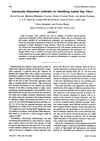Search
for
Sort by
Research
600-630 / 1000+ results
research Prolactin and the Skin: A Dermatological Perspective on an Ancient Pleiotropic Peptide Hormone
Prolactin affects hair growth and skin conditions, and could be a target for new skin disease treatments.

research Research Progress in Composition, Classification and Influencing Factors of Hair
Lipids are important for healthy hair, but their exact role is not fully understood and needs more research.

research The Proteomic Profile of Hair Damage
Bleaching hair damages protein structure, especially keratin, leading to weakened hair.

research Demethylation of Methionine and Keratin Damage in Human Hair
Copper and iron cause keratin damage in hair by converting methionine to homocysteine.

research Keratin Function and Regulation in Tissue Homeostasis and Pathogenesis
Keratin is crucial for keeping skin cells healthy and its changes can lead to diseases and affect cell behavior.
research Key Factors in the Complex and Coordinated Network of Skin Keratinization: Their Significance and Involvement in Common Skin Conditions
Understanding keratinization is crucial for treating skin conditions like ichthyoses and psoriasis.

research Biology of the Skin and Dermatological Disease
Knowing how skin works and its diseases helps doctors diagnose and treat skin conditions better.

research Perspectives on Dermatopathology
Dermatopathology has made significant progress but many skin diseases remain incurable, requiring ongoing research.
research Hair Loss Caused by Gain-of-Function Mutant TRPV3 Is Associated with Premature Differentiation of Follicular Keratinocytes
A gene mutation causes early keratinocyte maturation leading to hair loss in Olmsted syndrome.

research Size Polymorphisms in the Human Ultrahigh Sulfur Hair Keratin-Associated Protein 4, KAP4, Gene Family
The study found that variations in hair protein genes are likely due to evolutionary deletions or duplications.

research Exploring the Effects of Wetting and Free Fatty Acid Deposition on a Hair Fiber Surface Model Incorporating Keratin Associated Protein 5-1
Water and fatty acids affect hair's surface differently based on hair damage, and models can help understand hair-cosmetic interactions.

research Ultrashort Peptide Nanofibrous Hydrogels for the Acceleration of Healing of Burn Wounds
Peptide hydrogels heal burn wounds faster and better than standard dressings.

research Low Molecular Weight Collagen Peptide Promotes Hair Growth by Activating the Wnt/GSK-3β/β-Catenin Signaling Pathway
A type of collagen helps hair grow by boosting cell growth and activating a specific hair growth pathway.

research Human Hair Keratin-Associated Proteins
Hair keratin-associated proteins are essential for strong hair, with over 80 genes showing specific patterns and variations among people.

research Epidermal Differentiation Complex: A Review on Its Epigenetic Regulation and Potential Drug Targets
Understanding how EDC genes are regulated can help develop better drugs for skin diseases.

research Expression Analysis of the Type I Keratin Protein Keratin 33A in Goat Coat Hair
Keratin 33A is a key protein in goat winter coats, especially in high-producing breeds.

research Anti-Keratin Monoclonal Antibodies for Identifying Animal Hair Fibers
Scientists made antibodies to tell cashmere and wool apart, which could improve how we identify animal fibers.

research Treatment of a Spinal Cord Hemitransection Injury with Keratin Biomaterial Hydrogel Elicits Recovery and Tissue Repair
Keratin hydrogel from human hair helps rats recover better from spinal cord injuries.

research PH Dependence of the Coiled-Coil Structure of Keratin Intermediate Filament in Human Hair by 13C NMR Spectroscopy and the Mechanism of Its Disruption
Keratin structure in hair is stable at pH 5-6 but disrupts between pH 6-7.

research Culture and Differentiation of Human Hair Follicle Dermal Papilla Cells in a Soft 3D Self-Assembling Peptide Scaffold
The 3D scaffold helped maintain hair cell traits and could improve hair loss treatments.

research Penetration of Drugs Through Skin: A Complex Rate-Controlling Membrane
The skin is a complex barrier for drug penetration, but understanding its structure and interactions can improve drug delivery methods.

research Mind the Gender Gap: Does Prolactin Exert Gender and Site-Specific Effects on the Human Hair Follicle?
Prolactin may affect hair growth differently based on gender and scalp area.

research Urticaria Neonatorum: Accumulation of Tryptase-Expressing Mast Cells in the Skin Lesions of Newborns with Erythema Toxicum
Newborns with the common rash Erythema Toxicum have many active mast cells in their skin, but these cells don't produce the LL-37 peptide.

research Homo- and Heteropolymer Self-Assembly of Recombinant Trichocytic Keratins
Recombinant keratins can form useful structures for medical applications, overcoming natural keratin limitations.

research Skin: Basic Structure and Function
The skin is a complex barrier that protects the body, regulates temperature, and helps with immune responses.

research Wound Healing
Wound healing is complex and requires more research to enhance treatment methods.

research The Basic Science of Hair Biology
Hair disorders are caused by a complex mix of biology, genetics, hormones, and environmental factors, affecting hair growth and leading to conditions like alopecia.

research Choreographing Immunity in the Skin Epithelial Barrier
The document concludes that the skin's immune system is complex, involving interactions with hair follicles, nerves, and microbes, and can protect or cause disease, offering targets for new treatments.

research Molecular and Spatial Design of Early Skin Development
The research reveals how early embryonic mouse skin develops from simple to complex structures, identifying various cell types and their roles in this process.